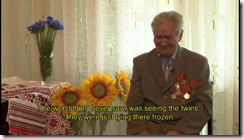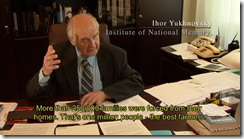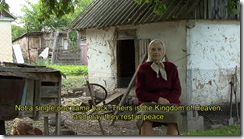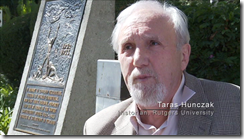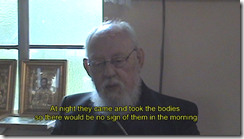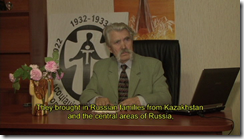 Today, every fourth Saturday night in November, Ukrainians worldwide commemorate the 80th anniversary of the Great Famine of 1932-33, known as the Holodomor (Death by Hunger):
Today, every fourth Saturday night in November, Ukrainians worldwide commemorate the 80th anniversary of the Great Famine of 1932-33, known as the Holodomor (Death by Hunger):
Background
Entire villages were wiped out, and in some regions the death rate reached one-third. The Ukrainian countryside, home of the "black earth", some of the most fertile land in the world, was reduced to a silent wasteland.
Cities and roads were littered with the corpses of those who left their villages in search of food, but perished along the way. There were widespread reports of cannibalism.
Ms Karpenko says that when school resumed the following autumn, two thirds of the seats were empty.
But the pain of the Holodomor comes not only from the unfathomable number of dead. Many people believe the causes were man-made and intentional. A genocide.
They say that Joseph Stalin wanted to starve into submission the rebellious Ukrainian peasantry and force them into collective farms.
The Kremlin requisitioned more grain than farmers could provide. When they resisted, brigades of Communist Party activists swept through the villages and took everything that was edible.
"The brigades took all the wheat, barley – everything – so we had nothing left," says Ms Karpenko. "Even beans that people had set aside just in case.
"The brigades crawled everywhere and took everything. People had nothing left to do but die."
As the hunger mounted, Soviet authorities took extra measures, such as closing off Ukraine’s borders, so that peasants could not travel abroad and obtain food. This amounted to a death sentence, experts say.
"The government did everything it could to prevent peasants from entering other regions and looking for bread," says Oleksandra Monetova, from Kiev’s Holodomor Memorial Museum.
"The officials’ intentions were clear. To me it’s a genocide. I have no doubt."
But for others, the question is still open. Russia in particular objects to the genocide label, calling it a "nationalistic interpretation" of the famine.
Kremlin officials insist that, while the Holodomor was a tragedy, it was not intentional, and other regions in the Soviet Union suffered at that time.
Kiev and Moscow have clashed over the issue in the past. But Ukraine’s present leader Viktor Yanukovych echoes the Kremlin line, saying it was "incorrect and unjust" to consider the Holodomor "the genocide of a certain people".
Mr Yanukovych’s government still takes care to commemorate fully the destruction that the famine wrought.
In the news
Edmonton survivor Leonid Korownyk remembers his childhood during the famine:
Each time, they risked being shot by soldiers enforcing Soviet dictator Josef Stalin’s decree to confiscate Ukraine’s grain harvest to crush both the resistance to collectivized farms and the national spirit.
Many times, Russian soldiers would charge into a farmer’s house and take everything, breaking up the families, sending people to Siberia
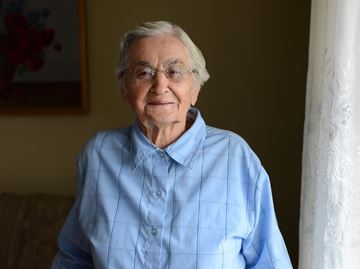 Burlington survivor Maria Sagan also remembers her childhood during that time:
Burlington survivor Maria Sagan also remembers her childhood during that time:
“Our mother died when I was young,†said Sagan.
“Father was taken to Siberia in Russia. I never heard from him again, no letters nothing.†…
According to Sagan, she and her sister lived near collective farms that were owned by the Soviet Union during the famine. They were forced to work on the farms but were not allowed to take any produce.
“The fields belonged to the communist,†said Sagan.
“If the communist caught me, I’d be punished. If you were caught, many times they would just shoot you on the spot.â€
Farms across eastern Ukraine had their farm animals taken away from them. Communist brigades came around harvested vegetables, destroyed the soil and took everything they could.
In an innovative twist, Lviv Plast boy scouts will cook the food eaten by starving Ukrainians as part of a Holodomor awareness campaign.
Still disputing the numbers
One thing that many news outlets still like to report on is the ‘controversy’ around the number of people who died, as if it really matters:
The Ukrainian Canadian Congress says seven million to 10 million died, though the numbers are still being researched.
The latest study from Ukraine demographers puts the total of 3.9 million deaths from direct starvation, Himka said.
But Jars Balan, also a professor at the U of A’s Ukrainian Canadian studies, said that the 3.9 million total does not include tens of thousands of Ukrainians deported to Siberia, many peasants executed on their doorsteps and deaths just outside Ukraine among Cossacks in those years.
Stalin suppressed the 1937 census data that showed the huge population losses in Ukraine then shot the census takers, Balan added. For years after that, it was difficult to get accurate data to determine how many died until the fall of the former Soviet Union in 1991, Himka said.
Then, Russian census data from those years became available.
Events
Here are a list of Holodomor events happening this weekend around Canada:
In the books
Two books involving the Holodomor are out now:
Andrea Chalupa, author of Orwell and the Refugees: the Untold Story of Animal Farm, has read her grandfather’s heartbreaking memoirs of life in Soviet Ukraine.
"It’s very much a personal story that I share," she said of her scheduled talk Sunday at the Royal Botanical Gardens.
Her grandfather was a survivor of the Holodomor, in which millions of people were systematically starved to death in 1932-33. He would have been 19 or 20 at the time, she said.
"It is heartbreaking. He describes witnessing an innocent baby, pawing at his mother on the side of the road, trying to wake her up."
Sunday’s commemorative event is put on by the Ukrainian Canadian Congress of Hamilton to honour those who died during the famine.
While figures vary, some report as many as 10 million people died.
Chalupa says this very "politicized" history has only come into the mainstream, academically, in the last 10 years.
"I’m still getting, ‘Wow, I did not know this happened.’
"It’s incredibly heartbreaking; it’s incredibly frustrating and it’s really what fuels my work," Chalupa said.
Her book traces the story of Orwell’s correspondence with a Ukrainian refugee, and the eventual translation of Animal Farm, 2,000 copies of which were delivered to camps to empower the Ukrainian people.
Her uncle had one of those copies. It now sits on her dresser as a reminder of what they went through, especially 80 years later, as living witnesses are so few.
"There’s a risk it may be forgotten," Chalupa said.
"But I’ve also experienced the power of the shock value — hopefully this (works such as her book) will help produce a snowball effect as more and more researchers and storytellers feel shocked, then compelled to expose the truth."
Orwell and the Refugees: the Untold Story of Animal Farm is available digitally for only 99 cents! I bought it.
The other book out now is a novel that takes place during the Holodomor:
In the midst of famine during a forgotten Stalinist genocide, DANYA KOMYSA is a proud Cossack Partisan, forced to witness the murder of his wife during the Soviet Purges and Famine of 1932. Despite his heroic defiance against BOHDAN VRATEK Stalin’s most notorious Chekist General, his lone crusade for retribution seems hopeless. Now as Danya wrestles with his destiny he encounters a powerful resistance group and takes on a deadly challenge. He must chaperone NATALKA ZAKHAROV, once Stalin’s favourite adjutant, yet now Russia’s most wanted fugitive, to Kharkiv City as she flees from the same Chekist General who murdered his wife. As the notorious GENERAL VRATEK and his Cheka Secret Police pursue the pair across the nation, Danya and his Chekist adversary are drawn ever closer together. Relentless conflict, incarceration and rescue soon follow as the chase builds to a dramatic climax in Kharkiv City. Love strikes deep into two open hearts as Danya and Natalka are bound by tribulation and the high emotion of unrelenting pursuit. Finally, Danya settles an astonishing score from the past, delivering a fatal blow deep into the heart of Stalin’s machinery of terror. Now Danya has fulfilled his destiny, as the tide of destruction that has brought his country to its knees draws to a premature close.
Set against a backdrop of real historical events and richly laced with spiritual intrigue, THE WAY OF VENGEANCE is an unforgettable journey of passion, courage and survival.
Recognition
While Australia, Canada, Colombia, Ecuador, Estonia, Georgia, Hungary, Latvia, Lithuania, Mexico, Paraguay, Peru, Poland and the Vatican have all recognized the Holodomor, it is still being pursued to be acknowledged by UK Parliament as genocide.


